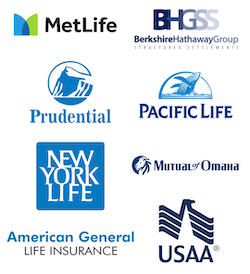 |
||||
|
June
2023 |
||||
 |
||||
| Forward | Subscribe |
||||
| Refer a Case | | | My Profile Page | | | Medicare Solutions | | | Download vCard |
Certainty Backed By the Nation’s Largest and Strongest Life Insurance Companies
 Ringler only works with the nation's top-rated life insurance companies.
Ringler only works with the nation's top-rated life insurance companies.Banks make money through their ability to leverage. They are required to keep as little as 10% of the capital they take in on hand. The rest is reinvested through loans and other consumer services. This arrangement normally works fine unless their holdings are somehow devalued and they lack the capability to meet a current demand from account holders for cash. As the banking industry is federally regulated, depositors are protected by coverage provided by the Federal Deposit Insurance Corporation (FDIC).
Life insurance companies are required to hold reserves for the policies they issue and risks they assume. Those reserves are established based on formulas that take into account when an anticipated claim or payment is due, discounted by the company’s earnings on investments. Even with that discounting, the simple fact is that insurance companies keep the vast majority of their “depositors” funds on hand – not loaned out. For added security those same insurers maintain an extra measure of safety in assets held as “surplus.” Financial ratings for each company are readily available and are derived by detailed analysis of not only financial statements, but also deep dives into the underlying assets disclosed on those statements. This “risk based capital” approach applies another level of scrutiny. And as the insurance industry is state-regulated, there are 50 sets of collective eyes evaluating each major life insurer.
The last thing an accident victim needs to take on with their settlement dollars is too much risk. Many have experienced loss beyond which even their advisors are unable to fully appreciate. The value of a structured settlement is that it is funded by a structured annuity issued by a handful of the nation’s largest and strongest life insurers who operate in arguably the most highly regulated industry in the United States. Market-based investments are great at protecting against inflation and can deliver superior returns, but they should be taken in a suitable dose and along with something that is actually guaranteed. Couple that security along with the tax-free nature of structured settlement benefits, and you have a recipe for success.
In a perfect world, claim professionals and trial attorneys alike should have a big red “SAFE” button on their desks they can hit when they see someone who has future needs that cry out to be protected. In reality it’s as “EASY” as picking up the phone and calling or sending an email to a Ringler Settlement Advisor. Like the life insurers we represent, we’ve been around for a long time and stand ready to provide security and help reestablish hope for individuals and families who have experienced loss.





